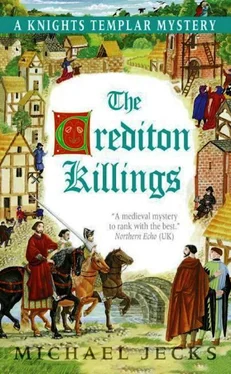“No. That’s inconceivable, according to the men who caught him. Apparently they had been following him for some time, after they saw him behaving oddly – I think they said ”furtively“ – in town.”
“They could have marked the spot where he hid it so that they themselves could return there and claim it.”
“It’s possible,” Baldwin agreed.
“But you don’t think so?”
Baldwin shook his head. “Sir Hector de Gorsone has some thirty odd men with him. He has undoubtedly fought in several campaigns, and his soldiers are battle-hardened. All can kill. It is quite feasible that these two men could have seen where the silver was placed, as you say, but what then? They would not have left Cole alive to say where it had been stored; they would have killed him immediately. Then they could go to it whenever they wanted. If they were to stay with Sir Hector, they would have a hard time explaining where any new wealth came from, but on the other hand, if they were to try to run away, where could they go? And don’t forget they would have incurred the wrath of their captain. He would be bound to seek revenge, if only to reimpose his will on the other men. The two with the silver would find thirty or so highly motivated men chasing after them wherever they tried to go. I think that if they saw Cole making a fool of himself, then witnessed him hiding something, they would have told their master as soon as they found out about the robbery.”
“What if they did not realize that it was their master’s silver? Couldn’t they have decided to profit by someone else’s theft and hidden it to collect later?”
“That is possible, but as soon as they found out it was Sir Hector’s treasure they would be bound to tell him where it was. They would be unhappy to steal from him, I would think, although they might expect a reward for bringing it back.”
“People can react fast to changing circumstances,” the Bishop said. “Perhaps they secreted it somewhere new, so they could go back to it later.”
“Unlikely,” Sir Baldwin decided. “In the first place, like I say, I believe they would have killed Cole to ensure that their secret was safe. Then again, they had no idea how long it would take for the robbery to be discovered, so they could not know how much time they had to hide the silver. I think they would have tried to capture the thief and deliver him up to their master. After all, even if they are mercenaries, they are still soldiers. Their whole life is tied up with their companions.”
“I have known men-at-arms who have been disliked by their companions and who have disappeared as soon as a good sum became available,” the Bishop observed.
“So have I,” Baldwin admitted. “But until I see evidence of that, I shall assume that these two have been telling the truth. And, of course, we do have a suspect in jail. Right now he is the most likely culprit.”
Margaret leaned forward. “Why would he have killed the girl? There was no need, surely?”
“Possibly – and possibly not. There is one simple explanation. He went into the room to steal the silver and either she was there already or she came in a little later. Either way, he knew that if she spoke of him being in Sir Hector’s room his life would be forfeit. He killed her to save his own skin, then hid the body so that he could make good his escape.”
Roger de Grosse was sitting nearby, and he frowned at this. “Surely, Sir Baldwin, if he was intending to make his escape, he would have planned a better means than his own feet?”
“A very good point. But it is possible that in the first case he intended taking the silver and hiding it, so he could return to it later when the fuss had died down.”
“How did he do it? From what you have said, he would have been seen leaving by the hall, and the shutters were closed. He couldn’t have jumped from a window.”
Baldwin glanced at Simon. “I have told them about our talks last night,” he said. “That, Roger, is still the point which interests me. Again, we don’t know how, but several explanations are possible.”
“Could Sarra have been an accomplice? She might have opened the shutters for him and closed them after he left.”
Baldwin smiled. “And afterward he wandered back in and killed her? No, all we know is that he must have taken the silver some time after Sir Hector rose from his bed, and before the captain returned from his meal.”
The bailiff nodded. “I look forward to hearing how he did it.”
The jail was a small building near the market, almost opposite the inn. Commonly it was used for victims of the Pie Powder courts, at which market traders were convicted for selling short measures or defective goods, but it also served for those committed for more serious offenses. Small, stone and square, it lurked malevolently near the toll-booth, a focus of fear for people of the town, for many of those who entered would only leave to make their way to the gallows.
It was only a few minutes’ walk from Peter’s house. Baldwin and Simon set off immediately after their breakfast. Roger had asked if he might join them, and Stapledon agreed that it could be useful for the rector to witness how investigations were conducted.
Even this early in the morning the street was busy. Hawkers strolled, yelling their offers to the world, horses clattered along the partly cobbled way, wagons thumped and rattled past, and Simon smiled to see the children running and jumping in and among the traffic. He saw the woman in gray, her child nearby, but she did not appear to recognize him. He did not blame her: it had been late when he helped her, and dark in the street. She stood quietly, a begging bowl in her hand, smiling pitifully at all who passed in a desperate attempt to win alms. Simon averted his gaze. There were so many, especially after the years of famine, who needed the charity of others to survive, yet the sight of beggars always made him feel uncomfortable.
All along the way Roger found his nostrils assailed by the fumes of the busy, growing town. Sharp woodsmoke gave a wholesome background, but more pervasive was the noisome stench rising from the open sewer in the street, to which the dung of horses, oxen, pigs and sheep all added their malodorous reek. As they approached the inn, the smells altered, subtly proclaiming the presence of the butcher.
They stopped to watch. The butcher’s was on the corner of two streets, right next to the inn, and behind it Roger could make out the cookshop. A little beyond was the lane which led behind the cookshop, past the stables, to the inn’s yard. Before the inn itself was the small pile of animal remains Baldwin had stood in the night before; now four stray dogs hovered over it, snatching what they could and snarling at each other.
In front of the butcher’s itself Roger saw the rotund little figure of Adam at his work, a large knife in his hand, and dressed in his heavy old apron. The rector paid little attention; he was staring at a hawker further up the street when there was a loud, piercing squeal that made the hair on the back of his neck tingle.
When Roger turned in horror, he saw that the butcher had stuck a pig. It hung upside down from a tripod by a rope around its hind legs, jerking and twitching as the blood bubbled and gushed from the vivid gash in its throat, dripping into a large pot underneath. As its struggles decreased, the butcher slit it from breast to pelvis, and the entrails, massive ropes of yellow brown, suddenly slithered free like so many snakes from a sack. An assistant was already tipping boiling water over the animal and readying his razor to remove all the bristles from the body, and Adam had his hands inside the carcass pulling out the heart and lungs as he watched.
Читать дальше












